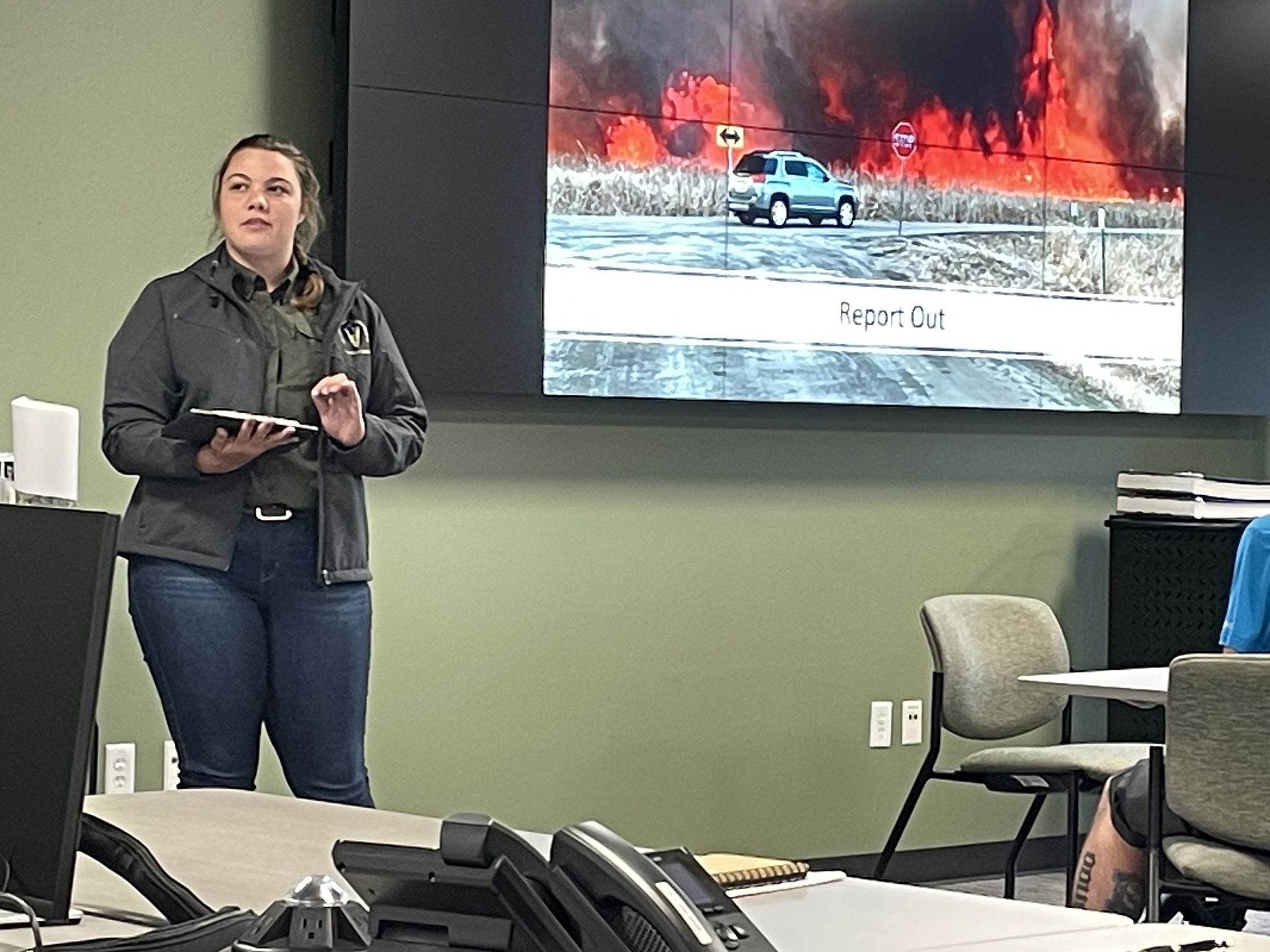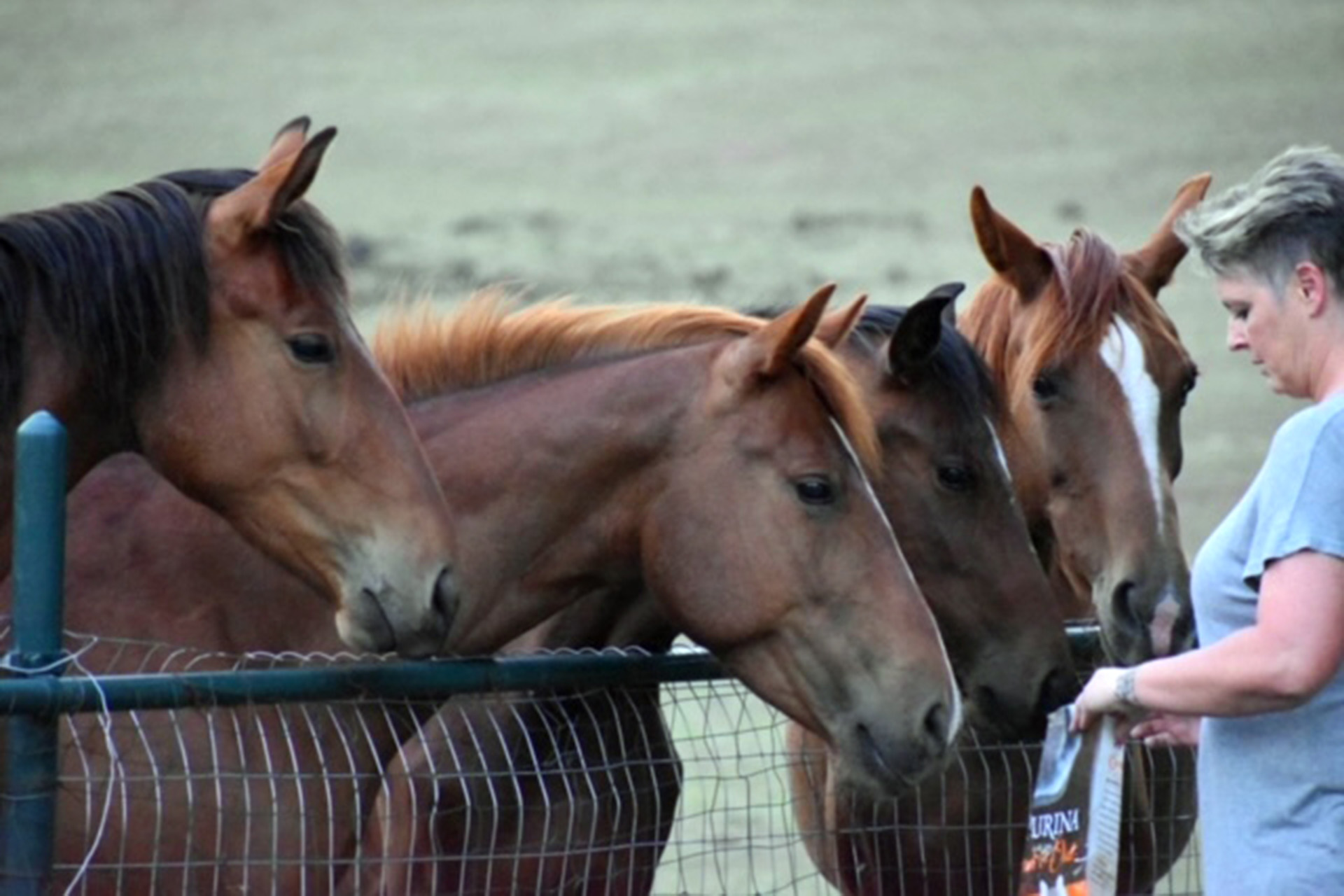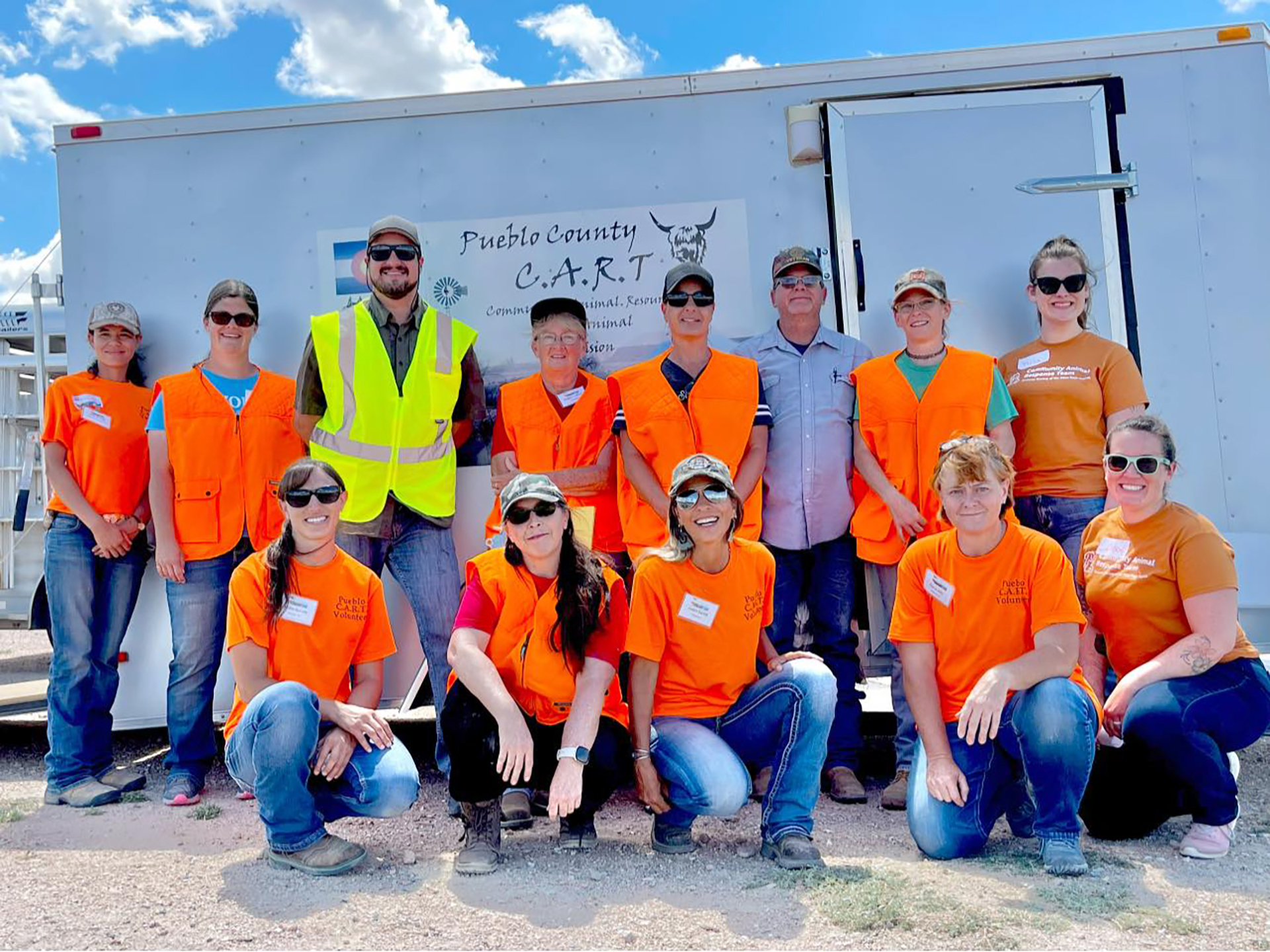
Jasmine Blattner, a veterinary medicine student, delivers a report on large animal evacuations during a simulated prairie fire at a Larimer County emergency management meeting. Blattner is one of three CSU Extension interns working with the Colorado Department of Agriculture this summer to draft all-hazards response plans for wildfire, drought, severe heat, flood and tornadoes. Photo courtesy of Dan Frazen
Disaster ready: CSU Extension partners with Colorado communities to be resource when they need it most
story by Jayme DeLoss
published July 31, 2023
When the North Creek Fire was bearing down on Susan DeFeo’s property near Beulah, she and her boyfriend, Jon Tisdel, quickly loaded two of their horses and their goats into trailers. Two of their horses refused to board. With the fire only a mile away, and the sheriff advising them to evacuate, they had to leave Possum and Reina behind.
Animal control officials – who are accustomed to handling domestic animals – also tried in vain to load the horses. In one last attempt to evacuate the mustang and mustang-quarter horse, the Pueblo County Extension Community Animal Response Team (CART) successfully loaded the stubborn horses onto a trailer and took them to a shelter for safekeeping.
“The response team was just amazing,” DeFeo said. “They were always in direct communication with me on what was going on.”
CART members cared for DeFeo’s horses overnight, making sure they had food and water, until she picked them up the next day. Amid the chaos of her own evacuation and finding shelter for her other animals, she appreciated having one less concern weighing on her mind.
DeFeo praised the whole community for their support and generosity during the crisis. Neighbors help neighbors in communities like Beulah, and among those neighbors are local CSU Extension team members, who help the community plan for, respond to and recover from disasters like fires, snowstorms, droughts, floods, and animal or human pandemics.
CART before the horse rescue

Susan DeFeo feeds Reina, Possum and her other horses. Possum and Reina were evacuated from the North Creek Fire by a Community Animal Response Team organized by Pueblo County Extension. Photo courtesy of Susan DeFeo
Beth Hayes was teaching a grape-growing workshop on the other side of the county when she was activated April 15 in response to the North Creek Fire. As the Extension agriculture and natural resource coordinator for Pueblo County, Hayes leads the Community Animal Response Team in addition to myriad other duties – including cooking lamb to pair with wine for the workshop that evening.
Hayes comes from a family of first responders, so being called to action at a moment’s notice is nothing new to her. From the emergency operations center, Hayes dispatched her team to evacuate DeFeo’s horses.
Pueblo County CART volunteers are trained to handle livestock. Many of them have livestock of their own, and training and FEMA certification are required to earn their badges. Hayes leads drills throughout the year on how to handle poultry, swine, sheep, rabbits, horses, cattle – including Texas Longhorns – and even bison and emu.
“These folks dedicate their time to train and be the best they can be for the community, and it paid off when we needed it,” Hayes said.
Extension plays an important role in emergency preparedness, response and recovery throughout Colorado, but the role varies from county to county based on resources and subsequent needs. In Pueblo County, Extension staff are on call at the request of the county emergency manager and work alongside first-responder agencies such as local fire departments, Hayes said, “because we’re so involved in these communities. We have those connections.”
Not a matter of ‘if’ but ‘when’

The Pueblo County Community Animal Response Team led by Extension coordinator Beth Hayes, left, is comprised of volunteers who train regularly to handle livestock in emergencies. Photo courtesy of Beth Hayes
When Dan Frazen started in his position as emergency coordinator with the Colorado Department of Agriculture, he was advised to partner with Extension staff because they know their communities and resources.
“All disasters start and end local,” Frazen said, calling Extension a “force multiplier” in responding to emergencies because of that insider knowledge.
Frazen, an experienced crisis manager and proud CSU alumnus, was on the incident management team for the Cameron Peak Fire. Now, he’s focused on preparing for disasters to minimize losses.
“Ag is critical infrastructure. If we lose farms, crops, cattle, there is a serious impact on rural communities, our state economy and national economy,” he said. “We have to do all we can to partner with, prepare and protect our agricultural communities.”
Frazen is working with Veterinary Extension Specialist Ragan Adams and three Extension interns from the College of Veterinary Medicine and Biomedical Sciences to draft all-hazards response plans for wildfire, drought, severe heat, flood and tornadoes.
One of the interns is also compiling an after-action report on the state’s highly pathogenic avian influenza response. These projects will influence how the Colorado Department of Agriculture prepares for and manages future disasters. As the only CDA employee solely dedicated to emergency management, Frazen is grateful for the interns’ help and partnership with Extension.
Adams is a strong supporter of the Extension internships as an opportunity for students to work with community partners on public issues. Her focus is on planning for animals in disasters, but she was tapped during the Marshall Fire to help with recovery from the most destructive wildfire in Colorado history.
As the liaison among the state recovery team, state land-grant university, and Boulder County Extension office, Adams worked with Boulder County Extension personnel, whose local knowledge and relationships framed the needs of the community, and campus-based experts who applied their research knowledge to recovery efforts.
“We help communities solve community problems,” Adams said. “Extension is there before, during and after the disaster.”
CSU Extension provides a variety of emergency resources online, including resources specific to animals.
Summers of Smoke
For decades, Colorado State University has been at the forefront of fire science, earning its reputation as one of the leading institutions studying wildfires. Explore other stories on wildfire research at CSU.